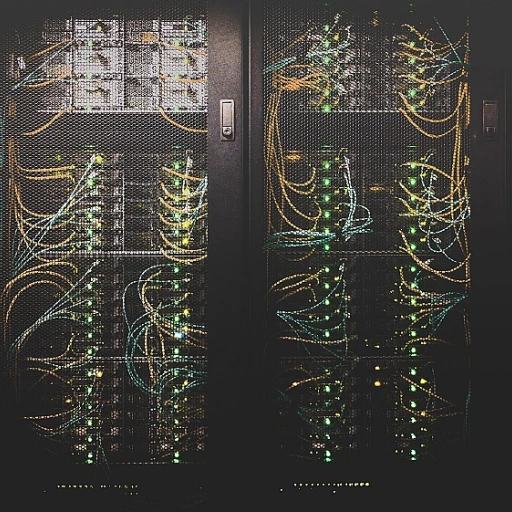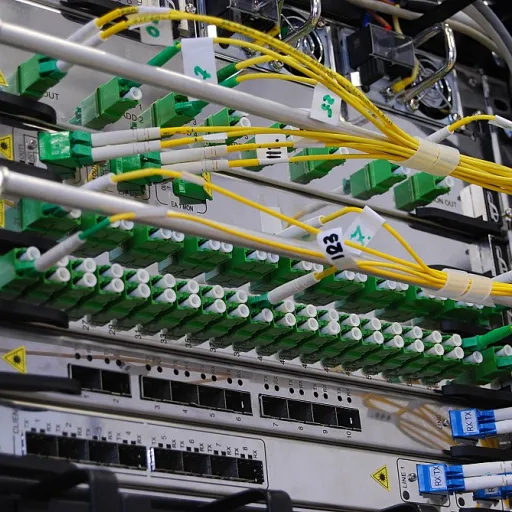
The significance of the acquisition
Strategic Move in the Photonics Arena
The acquisition of Luceda Photonics by Synopsys marks a significant milestone in the realm of integrated photonics. This strategic move underscores the growing importance of photonics in the software industry, particularly in the design and production of photonic chips. Luceda, a Belgian company, brings a wealth of expertise in photonic chip design and analytics wafer technologies, which are crucial for enhancing yield and mass production capabilities.
With this acquisition, Synopsys aims to bolster its capabilities in photonic design software, leveraging Luceda's advanced tools and technologies. The integration of Luceda's team and technologies will enable Synopsys to offer more comprehensive solutions in the photonics sector, addressing the increasing demand for high-yield photonic chips in various applications.
Luceda's expertise in photonics, particularly in the area of wafer level testing and yield enhancement data analytics, aligns well with Synopsys' vision of expanding its footprint in the global market. This move is expected to drive growth and innovation, positioning Synopsys as a leader in the photonics industry.
For more insights into how this acquisition reshapes the competitive landscape, you can explore the competitive landscape of Glean.
Photonics: The next frontier in software
Exploring the Potential of Photonics in Software
Photonics is rapidly emerging as a pivotal element in the evolution of software, marking a significant shift towards more advanced and efficient technologies. As companies like Luceda Photonics and others in the industry continue to innovate, the integration of photonics into software design is becoming increasingly critical. This acquisition by Synopsys underscores the growing importance of photonics in the tech landscape.
Photonics, often referred to as the next frontier in technology, offers numerous advantages over traditional electronic systems. The ability to manipulate light for data transmission and processing can lead to faster, more efficient, and higher yield production processes. This is particularly relevant in the context of integrated photonics, where photonic chips are designed to perform complex functions with minimal energy consumption.
With the expertise of Luceda Photonics, known for their advanced PIC design software, Synopsys is well-positioned to enhance its capabilities in photonic chip design. This strategic move not only strengthens their portfolio but also sets the stage for breakthroughs in wafer level testing and yield enhancement. The collaboration between these companies is expected to drive significant growth in the photonics sector, particularly in regions like Belgium and Singapore, where innovation in this field is thriving.
As the demand for high-speed data analytics and efficient chip design continues to rise, the role of photonics in software development will become increasingly prominent. Companies like Semitronix and SMTX Technologies are also contributing to this trend by focusing on yield enhancement and analytics wafer technologies. The global market is poised for a transformation as photonics becomes integral to achieving high yield mass production and improving the overall efficiency of software systems.
For those interested in delving deeper into the intersection of photonics and software, exploring resources such as the Databricks Certified Data Analyst Exam can provide valuable insights into the data analytics aspect of this technological evolution.
Challenges in integrating photonics with software
Bridging the Gap Between Photonics and Software
The integration of photonics with software presents a unique set of challenges that companies like Synopsys and Luceda Photonics must navigate. As the acquisition unfolds, the focus will be on harmonizing the expertise in photonic chip design with advanced software capabilities. This endeavor is crucial for achieving high yield mass production of photonic chips, a goal that demands meticulous attention to both hardware and software intricacies.
One of the primary challenges lies in the wafer level testing and analytics. Ensuring that photonic chips meet the rigorous standards of performance and reliability requires sophisticated data analytics and yield enhancement techniques. Companies like Semitronix and Technologies Singapore are pivotal in this domain, offering solutions that enhance the production process and ensure consistency in output.
Moreover, the integration process must address the complexities of PIC design and the need for seamless communication between photonic components and software systems. This requires a collaborative effort from global teams, leveraging the expertise of groups in Belgium and Singapore Pte to drive innovation and growth. The role of data analytics in this context cannot be overstated, as it provides the insights necessary for optimizing chip design and production processes.
As the industry continues to evolve, the challenge will be to maintain a balance between innovation and practical application. The acquisition of Luceda Photonics by Synopsys is a strategic move that underscores the importance of integrated photonics in the future of software. By overcoming these challenges, the companies involved will not only enhance their competitive edge but also contribute to the broader advancement of technology in this exciting field.
Impact on innovation and research
Driving Innovation and Research Forward
The acquisition of Luceda Photonics by Synopsys is poised to significantly impact innovation and research in the field of photonics. As the global demand for photonic chips and integrated photonics continues to grow, this strategic move aligns with the industry's need for advanced design software and analytics capabilities. Luceda's expertise in photonic chip design and its strong presence in Belgium provide a solid foundation for Synopsys to enhance its offerings in this burgeoning sector.
With the integration of Luceda's technologies, Synopsys can leverage its existing resources to push the boundaries of photonic design and production. The collaboration between the two companies is expected to yield high returns in terms of research and development, particularly in areas like wafer level testing and yield enhancement. This partnership will likely accelerate the development of new photonic solutions, enabling faster and more efficient mass production of photonic chips.
Moreover, the combined efforts of Synopsys and Luceda will foster a more robust ecosystem for photonic innovation. By integrating Luceda's analytics wafer and enhancement data capabilities, Synopsys can offer more comprehensive solutions to its clients, driving further advancements in the field. This collaboration not only benefits the companies involved but also contributes to the overall growth of the photonics industry, paving the way for new breakthroughs and applications.
In conclusion, the acquisition is more than just a business transaction; it's a catalyst for innovation and research in the photonics domain. As the industry continues to evolve, the combined strengths of Synopsys and Luceda will play a crucial role in shaping the future of photonic technology, ensuring that it remains at the forefront of technological advancement.
Market implications and competitive landscape
Shaping the Competitive Landscape
The acquisition of Luceda Photonics by Synopsys is poised to significantly alter the competitive landscape in the photonics and software industries. As photonics emerges as a critical component in the next wave of technological advancements, companies are racing to integrate photonic chip design with existing software solutions. This move by Synopsys positions them at the forefront of this integration, potentially setting new standards for the industry.
Market Dynamics and Opportunities
With Luceda's expertise in photonic chip design and Synopsys' robust software capabilities, the combined entity is well-positioned to address the growing demand for integrated photonics solutions. This acquisition not only enhances Synopsys' portfolio but also opens up new markets, particularly in regions like Belgium and Singapore, where Luceda has established a strong presence. The collaboration is expected to yield high growth opportunities, leveraging Luceda's innovative design software and Synopsys' global reach.
Implications for Competitors
Competitors in the photonics and semiconductor industries will need to reassess their strategies in light of this acquisition. Companies like Semitronix and SMTX Technologies may face increased pressure to innovate and enhance their own offerings to maintain market share. The focus on yield enhancement and wafer level testing will become even more critical as the demand for high yield, mass production of photonic chips intensifies.
Driving Innovation and Collaboration
The integration of Luceda's photonic design capabilities with Synopsys' software solutions is expected to drive innovation across the industry. By combining their strengths, the companies can offer comprehensive solutions that address the complex challenges of photonic chip production. This collaboration will likely foster further research and development, encouraging other players in the market to pursue similar partnerships to stay competitive.
Future trends in software and photonics
Emerging Trends in Software and Photonics
The future of software is intricately linked with the advancements in photonics, a field that is rapidly gaining traction. As the acquisition of Luceda Photonics by Synopsys illustrates, the integration of photonics into software is not just a trend but a strategic move towards innovation and enhanced capabilities.
Photonics, particularly in the realm of photonic chip design and integrated photonics, is set to revolutionize how data is processed and transmitted. The demand for high-speed data analytics and wafer level testing is pushing the boundaries of what traditional electronic systems can achieve. This is where photonics steps in, offering solutions that promise higher yield and efficiency.
Several factors are driving the growth of photonics in software:
- Increased Data Demand: As global data production continues to soar, the need for efficient data processing solutions becomes critical. Photonics offers a pathway to meet these demands with its ability to handle large volumes of data at unprecedented speeds.
- Advancements in Chip Design: Companies like Luceda are at the forefront of photonic chip design, providing expertise that enhances the capabilities of software solutions. This expertise is crucial for developing systems that can support mass production and yield enhancement.
- Collaborative Innovation: The collaboration between software and photonics companies, such as the partnership between Synopsys and Luceda, fosters an environment of innovation. This synergy is essential for overcoming the challenges of integrating photonics with existing software technologies.
Looking ahead, the role of photonics in software will likely expand, influencing various sectors from telecommunications to healthcare. The Belgian company Luceda, with its strong foundation in photonic design, is well-positioned to lead this charge. As the industry evolves, the focus will be on creating solutions that not only meet current demands but also anticipate future needs.
In conclusion, the integration of photonics into software is not just a fleeting trend but a significant shift towards a more efficient and innovative technological landscape. The expertise of companies like Luceda and the strategic acquisitions by industry leaders will continue to shape the future of software, driving growth and enhancing capabilities across the board.





-large-teaser.webp)









